企业品牌战略研究外文翻译
- 格式:doc
- 大小:60.00 KB
- 文档页数:9
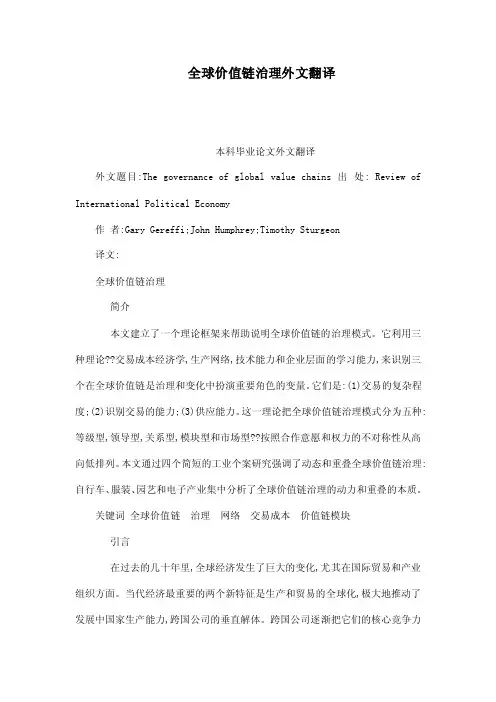
全球价值链治理外文翻译本科毕业论文外文翻译外文题目:The governance of global value chains出处: Review of International Political Economy作者:Gary Gereffi;John Humphrey;Timothy Sturgeon译文:全球价值链治理简介本文建立了一个理论框架来帮助说明全球价值链的治理模式。
它利用三种理论??交易成本经济学,生产网络,技术能力和企业层面的学习能力,来识别三个在全球价值链是治理和变化中扮演重要角色的变量。
它们是:(1)交易的复杂程度;(2)识别交易的能力;(3)供应能力。
这一理论把全球价值链治理模式分为五种:等级型,领导型,关系型,模块型和市场型??按照合作意愿和权力的不对称性从高向低排列。
本文通过四个简短的工业个案研究强调了动态和重叠全球价值链治理:自行车、服装、园艺和电子产业集中分析了全球价值链治理的动力和重叠的本质。
关键词全球价值链治理网络交易成本价值链模块引言在过去的几十年里,全球经济发生了巨大的变化,尤其在国际贸易和产业组织方面。
当代经济最重要的两个新特征是生产和贸易的全球化,极大地推动了发展中国家生产能力,跨国公司的垂直解体。
跨国公司逐渐把它们的核心竞争力专注于在营销和服务方面的产业创新、产品战略、市场服务的高附加值环节集中,同时大力削减一些非核心的功能如普通服务和批量生产等。
本文的目的是为更好的理解全球价值链治理结构的转变提供理论框架。
我们希望能够为现实世界存在的价值链治理模式的治理提供一些普遍适用的基本原则。
全球范围内生产组织的演变不仅仅影响公司发展和产业结构,而且对国家在全球经济中如何及为何前进与后退都有着极大的影响。
全球价值链的研究和政策制订工作对全球生产和分配体系组织方式及发展中国家提升其在国际市场竞争地位的可能性进行了探讨。
我们的愿望之一就是为各国制订产业升级、经济发展、就业创造、减轻贫困相关政策提供一定的借鉴。
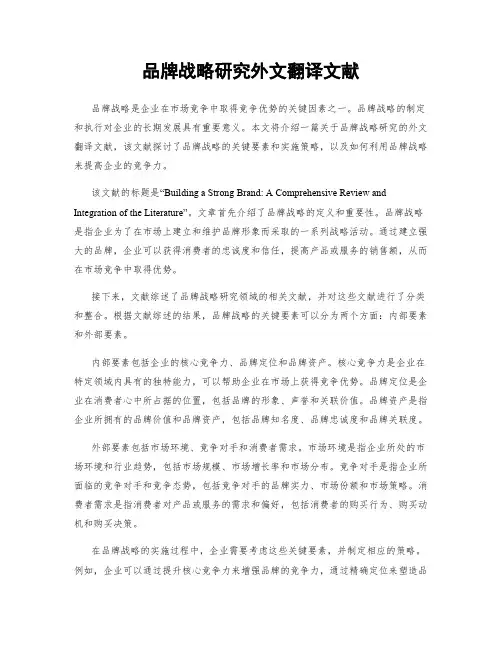
品牌战略研究外文翻译文献品牌战略是企业在市场竞争中取得竞争优势的关键因素之一。
品牌战略的制定和执行对企业的长期发展具有重要意义。
本文将介绍一篇关于品牌战略研究的外文翻译文献,该文献探讨了品牌战略的关键要素和实施策略,以及如何利用品牌战略来提高企业的竞争力。
该文献的标题是“Building a Strong Brand: A Comprehensive Review and Integration of the Literature”。
文章首先介绍了品牌战略的定义和重要性。
品牌战略是指企业为了在市场上建立和维护品牌形象而采取的一系列战略活动。
通过建立强大的品牌,企业可以获得消费者的忠诚度和信任,提高产品或服务的销售额,从而在市场竞争中取得优势。
接下来,文献综述了品牌战略研究领域的相关文献,并对这些文献进行了分类和整合。
根据文献综述的结果,品牌战略的关键要素可以分为两个方面:内部要素和外部要素。
内部要素包括企业的核心竞争力、品牌定位和品牌资产。
核心竞争力是企业在特定领域内具有的独特能力,可以帮助企业在市场上获得竞争优势。
品牌定位是企业在消费者心中所占据的位置,包括品牌的形象、声誉和关联价值。
品牌资产是指企业所拥有的品牌价值和品牌资产,包括品牌知名度、品牌忠诚度和品牌关联度。
外部要素包括市场环境、竞争对手和消费者需求。
市场环境是指企业所处的市场环境和行业趋势,包括市场规模、市场增长率和市场分布。
竞争对手是指企业所面临的竞争对手和竞争态势,包括竞争对手的品牌实力、市场份额和市场策略。
消费者需求是指消费者对产品或服务的需求和偏好,包括消费者的购买行为、购买动机和购买决策。
在品牌战略的实施过程中,企业需要考虑这些关键要素,并制定相应的策略。
例如,企业可以通过提升核心竞争力来增强品牌的竞争力,通过精确定位来塑造品牌形象,通过品牌推广和宣传来提高品牌知名度,通过创新和研发来提高产品或服务的品质,以满足消费者的需求。
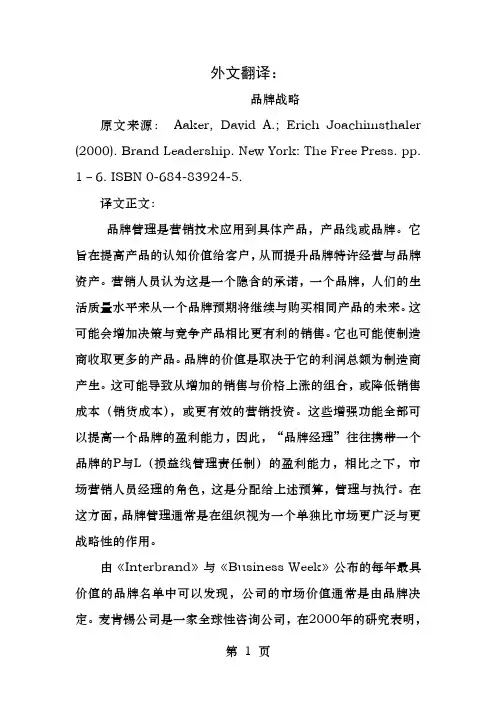
外文翻译:品牌战略原文来源:Aaker, David A.; Erich Joachimsthaler (2000). Brand Leadership. New York: The Free Press. pp. 1–6. ISBN 0-684-83924-5.译文正文:品牌管理是营销技术应用到具体产品,产品线或品牌。
它旨在提高产品的认知价值给客户,从而提升品牌特许经营与品牌资产。
营销人员认为这是一个隐含的承诺,一个品牌,人们的生活质量水平来从一个品牌预期将继续与购买相同产品的未来。
这可能会增加决策与竞争产品相比更有利的销售。
它也可能使制造商收取更多的产品。
品牌的价值是取决于它的利润总额为制造商产生。
这可能导致从增加的销售与价格上涨的组合,或降低销售成本(销货成本),或更有效的营销投资。
这些增强功能全部可以提高一个品牌的盈利能力,因此,“品牌经理”往往携带一个品牌的P与L(损益线管理责任制)的盈利能力,相比之下,市场营销人员经理的角色,这是分配给上述预算,管理与执行。
在这方面,品牌管理通常是在组织视为一个单独比市场更广泛与更战略性的作用。
由《Interbrand》与《Business Week》公布的每年最具价值的品牌名单中可以发现,公司的市场价值通常是由品牌决定。
麦肯锡公司是一家全球性咨询公司,在2000年的研究表明,相对股东比较弱的品牌,实力雄厚则品牌产生更高的回报。
两者合计,这意味着,品牌严重影响股东价值,最终品牌的首席执行官需要对其负责任。
管理学科的品牌开始了在宝洁公司的PLC作为一个由Neil 阁下麦克尔罗伊著名的备忘录的结果。
品牌管理原则一个好的品牌名称应:·受商标法保护。
·朗朗上口。
·容易被记住。
·容易被识别。
·在该品牌可以使用的范围内很容易被翻译成当地语言·吸引眼球。
·引出产品的优点(如:易关)·提升公司或产品形象。
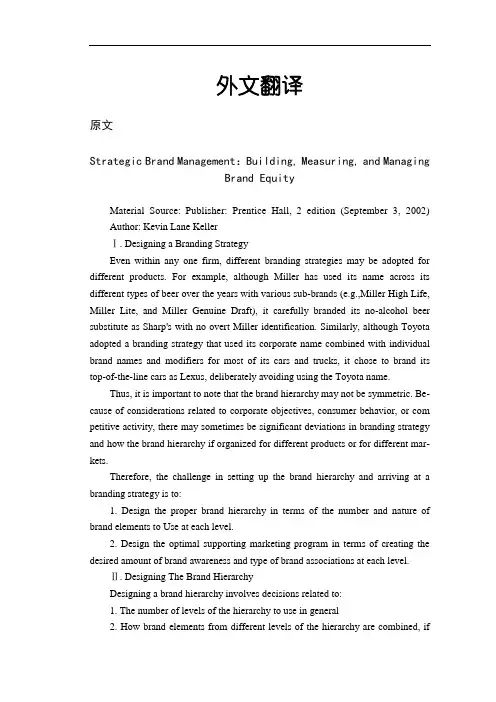
外文翻译原文Strategic Brand Management:Building, Measuring, and ManagingBrand EquityMaterial Source:Publisher: Prentice Hall,2 edition (September 3, 2002) Author: Kevin Lane KellerⅠ. Designing a Branding StrategyEven within any one firm, different branding strategies may be adopted for different products. For example, although Miller has used its name across its different types of beer over the years with various sub-brands (e.g.,Miller High Life, Miller Lite, and Miller Genuine Draft), it carefully branded its no-alcohol beer substitute as Sharp's with no overt Miller identification. Similarly, although Toyota adopted a branding strategy that used its corporate name combined with individual brand names and modifiers for most of its cars and trucks, it chose to brand its top-of-the-line cars as Lexus, deliberately avoiding using the Toyota name.Thus, it is important to note that the brand hierarchy may not be symmetric. Be-cause of considerations related to corporate objectives, consumer behavior, or com petitive activity, there may sometimes be significant deviations in branding strategy and how the brand hierarchy if organized for different products or for different mar-kets.Therefore, the challenge in setting up the brand hierarchy and arriving at a branding strategy is to:1. Design the proper brand hierarchy in terms of the number and nature of brand elements to Use at each level.2. Design the optimal supporting marketing program in terms of creating the desired amount of brand awareness and type of brand associations at each level.Ⅱ. Designing The Brand HierarchyDesigning a brand hierarchy involves decisions related to:1. The number of levels of the hierarchy to use in general2. How brand elements from different levels of the hierarchy are combined, ifat all, for any one particular product3. How any one brand element is linked, if at all, to multiple productWe consider issues related to these three main decisions in turn and also suggest ways to simplify and organize the hierarchy and designate products.The first decision to make in defining a branding strategy is, broadly, which level of levels of the branding hierarchy should be used. In general, most firms choose to use more than one level for two main reasons. Each successive branding level used allows the firm to communicate additional, specific information about its products. Thus, developing brands at lower levels of the hierarchy allows the firm flexibility in communicating the uniqueness about its products. At the same time, developing I brands at higher levels of the hierarchy such that the brand is applied across multiple I products is obviously an economical means of communicating common or shared in-formation and providing synergy across the company's operations, both internally and externally.The practice of combining an existing brand with a new brand to brand a prod-uct is called sub-branding,as the subordinate brand is a means of modifying the super-ordinate brand. Sub-branding often combines the company or family brand name with individual brands and even model types. Extending our earlier example, ThinkPad can be seen as a sub-brand to the IBM name with 760 as a second-level sub-brand to further modify the meaning of the product As suggested above, a sub-brand, or hybrid branding, strategy offers two potential benefits in that it can both1. Facilitate access to associations and attitudes to the company or family brand as a whole and, at the same time2. Allow for the creation of specific brand beliefs.At the same time, developing sub-brands allows for the creation of brand-specific beliefs. This more detailed information can help customers better understand how products vary and which particular product may be the right one for them. Sub-brands also help to organize selling efforts so that salespeople and retailers have a dear picture as to how the product line is organized and how it might best be sold. For example, one of the main advantages to Nike of continually creating sub-brands in its basketball line (e.g., Air Jordan, Air Flight, Air Force) has been to generate retail interest and enthusiasm.In general, the desired number of levels of the brand hierarchy depends on the complexity of the product line or product mix associated with a brand and thus thecombination of shared and separate brand associations that the company would like to link to any one product in its product line or mix. With relatively simple, low in-volvement products, such as light bulbs, batteries, and chewing gum, the branding strategy often consists of an individual or perhaps family brand combined with modifiers that describe differences in product features. For example, with a fairly simple product such as batteries, Eveready has two main brands (Energizer and Classic "9 Lives") combined with a voltage designation (AAA, AA, C, D, etc.). With a complex sot of products—such as cars, computers, or other durable goods—more levels of the hierarchy are necessary. Regardless of the complexity involved, it is difficult to brand a product with more than three levels of brand names without overwhelming or confusing consumers. In such cases, a better approach might be to introduce multiple brands at the same level (e.g., multiple family brands) and expand the depth of the brand portfolio.Ⅲ. Combining Brand Elements from Different LevelsIf multiple brand elements from different levels of the brand hierarchy are combined to brand new products, it is necessary to decide how much emphasis should be given to each brand element For example, if a sub-brand strategy is adopted, how much prominence should individual brands be given at the expense of the corporate or family brand?When multiple brands are used, each brand element can vary in the relative emphasis it receives in the combined brand. The prominence of a brand element refers to its relative visibility as compared to other brand elements. For example, the prominence of a brand name element depends on several factors, such as its order, size, and appearance, as well as its semantic associations. A brand name should generally be more prominent when it appears first, is larger, and looks more distinctive. For example, assume Pepsi has adopted a sub-branding strategy to introduce a new vitamin-fortified cola, combining its corporate family brand name with a new individual brand name (e.g., "Vftacola"). The Pepsi name could be made more prominent by placing it first and making it bigger— PEPSI Vitacola. On the other hand, the individual I brand could be made more prominent by placing it first and making it bigger— Vitacola B Y PEPSIAlong these lines. Gray and Smeltzer define c orporate/product relationships as the approach a firm follows in communicating the relationship of its products to one another and to the corporate entity. They identify five possible categories (with illus-trative examples)。
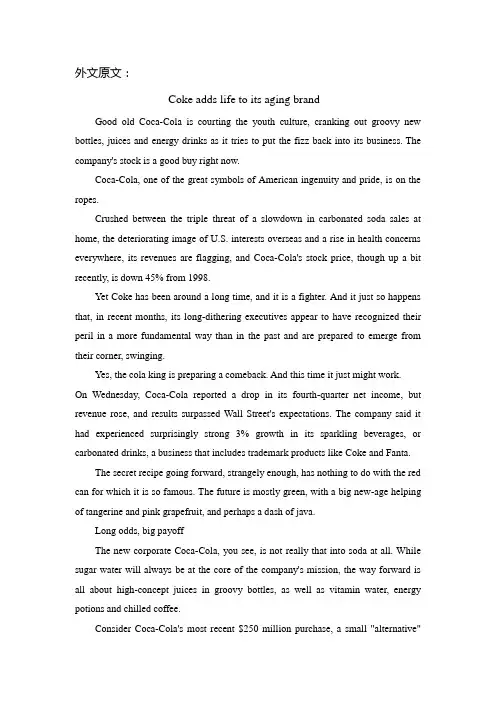
外文原文:Coke adds life to its aging brandGood old Coca-Cola is courting the youth culture, cranking out groovy new bottles, juices and energy drinks as it tries to put the fizz back into its business. The company's stock is a good buy right now.Coca-Cola, one of the great symbols of American ingenuity and pride, is on the ropes.Crushed between the triple threat of a slowdown in carbonated soda sales at home, the deteriorating image of U.S. interests overseas and a rise in health concerns everywhere, its revenues are flagging, and Coca-Cola's stock price, though up a bit recently, is down 45% from 1998.Yet Coke has been around a long time, and it is a fighter. And it just so happens that, in recent months, its long-dithering executives appear to have recognized their peril in a more fundamental way than in the past and are prepared to emerge from their corner, swinging.Yes, the cola king is preparing a comeback. And this time it just might work.On Wednesday, Coca-Cola reported a drop in its fourth-quarter net income, but revenue rose, and results surpassed Wall Street's expectations. The company said it had experienced surprisingly strong 3% growth in its sparkling beverages, or carbonated drinks, a business that includes trademark products like Coke and Fanta.The secret recipe going forward, strangely enough, has nothing to do with the red can for which it is so famous. The future is mostly green, with a big new-age helping of tangerine and pink grapefruit, and perhaps a dash of java.Long odds, big payoffThe new corporate Coca-Cola, you see, is not really that into soda at all. While sugar water will always be at the core of the company's mission, the way forward is all about high-concept juices in groovy bottles, as well as vitamin water, energy potions and chilled coffee.Consider Coca-Cola's most recent $250 million purchase, a small "alternative"beverage pioneer called Fuze. If you've never heard of it, you're probably not a 28-year-old woman. In years past, this was exactly the kind of concept drink the soda giant shunned. Now it's considered a potential lifesaver.Fuze was invented four years ago in the New Jersey basement of industry veteran Lance Collins. It's an awesome story of stubborn entrepreneurship. Collins knew the odds were around 97-1 against success, but he thought he saw a niche for low-calorie, high-taste, upscale juices for beautiful people, and gave it a shot. His design team created a gorgeous, colorful glass bottle for his "banana colada" and "peach mango" concoctions, gave them coy names like Slenderize, Refresh and Vitalize, called them "infuzions" instead of juices, and listed "transformative" ingredients like chromium, carnitine and Citrimax.This doesn't sound like Coca-Cola's cup of tea, but check out the infuzions. Collins started small by focusing on urban women in their 20s and 30s, then elbowed his way past the big boys of the game via an aggressive distribution strategy into one chain store after another. He sold 24 million bottles in 2003, double that in 2004, and double again last year.Success for a new beverage is all about persuading a distributor to make room for your stuff on its truck, and by all accounts Collins' salesmen pulled every trick in the book to fight their way into the awesome sales routes of Coke, Budweiser and Miller beer. You can now choose from an entire shelf of Fuze at the tiny Korean deli in Seattle where I get my lunch every day, which is astonishing for an independent brand. Or you can buy cases of it at Wal-Mart Stores , and in many supermarkets, not only in the United States but also in Asia, South America and Europe.Video: Coke's controversial, calorie-buring EnvigaCute little Fuze is the future of Coca-Cola because, well, everyone's doing it. Archrival PepsiCo started its own youth movement by buying the stunningly successful SoBe line of oddball tea and energy drinks for $370 million in 2000 and added the quirky independent Izze line of light juices, which my kids love, late last year. Coca-Cola bought natural juice maker Odwalla in 2001, and picked up Fuze earlier this month.Do you notice a pattern? Neither cola maker is buying any soda-pop companies, just these little wunderkinds, because that's where the growth in the industry is coming from. While carbonated soda's share of the market is shrinking, alternative beverage sales are jumping as much as 50% a year. And energy drink sales are advancing even faster. Fuze has a line of energy drinks, called NOS, that is aimed at car-racing fanatics. It has reportedly been muscling up well against Red Bull, Monster and No Fear in NASCAR towns, and now Coca-Cola will throttle up sales by pumping NOS -- which is short for nitrous oxide, an ingredient of racing fuel -- through its worldwide network. Zoom!International juiceAt the end of the day, all the successful grapefruit infusions in the world won't help a company like Coca-Cola much if the rest of the company is in the tank. They're a drop of sucralose in a giant bucket of syrup. Fortunately, revenues and earnings are improving elsewhere, particularly in international divisions.On Tuesday, we learned that sales volumes in Japan were up 5% in January, vs. a gain of 1% in January last year. That's important because while Japan only amounts to about 5% of Coca-Cola's total sales volume, pricing there is so outrageous that the country amounts to a whopping 20% of the company's total annual profits, according to Merrill Lynch estimate.Meanwhile, down in Mexico, Coca-Cola announced in December that it would join its largest bottler in that country to buy the second-largest Mexican juice company, Jugos Del Valle. That's another big attempt to bring noncarbonated sodas more powerfully into the mix. The company made similar deals last year in the Philippines and India, two more key regions.When you put it all together, you can see that Coca-Cola's earnings are being helped by the plain fact that its product balance is improving, with noncarbonated beverages like Fuze and Odwalla now amounting to 20% of its total sales, and regular old Coke and Diet Coke fading a bit into the back of the corporate fridge. It takes a while for investors to recognize this, but rising revenues serve to punctuate the new message. I estimate that Coca-Cola will earn $2.60 a share this year and $2.87 nextyear. When you put a price-earnings multiple of 21 on the 2008 figure, you get a price target of $60. That's 25% higher than the current quote, which makes the stock a good buy right now. If it doesn't work out, you can always mellow out with a chilled ginseng and guarana Fuze tea.Fine PrintTo learn more about Coca-Cola, visit its Web site. Its most controversial brand at the moment is Enviga, seen at this link, for which the company has made claims of weight-reduction. . . . There are so many more choices in the Coke lineup now, including Caribou coffee drinks, Powerade sports drinks and Minute Maid juices. . . . To see all the drinks it sells in individual countries, visit its Virtual Vender machine, a nice little Web app. . . . To learn more about Fuze brands, whose motto is "refreshingly smart," check out this Web site.出处:Jon Markman. Coke adds life to its aging brand [J]. Marketing Science. Oct 2005. pp25-28中文译文:可乐为其品牌老化增添生命力聪明的老牌子可口可乐公司正在追求青年文化。
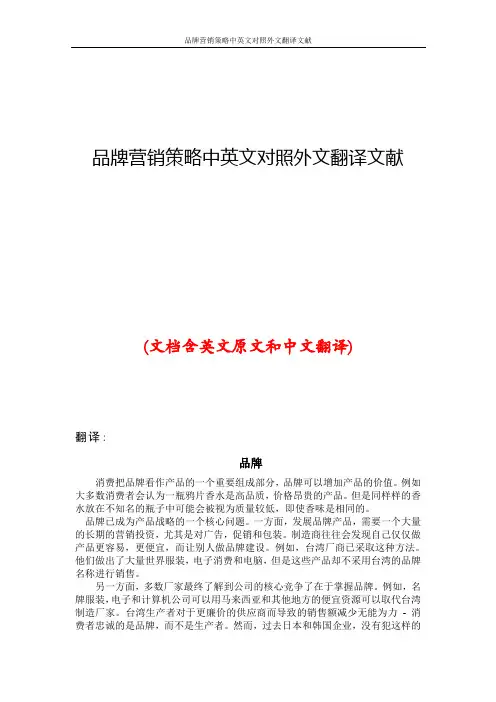
品牌营销策略中英文对照外文翻译文献(文档含英文原文和中文翻译)翻译:品牌消费把品牌看作产品的一个重要组成部分,品牌可以增加产品的价值。
例如大多数消费者会认为一瓶鸦片香水是高品质,价格昂贵的产品。
但是同样样的香水放在不知名的瓶子中可能会被视为质量较低,即使香味是相同的。
品牌已成为产品战略的一个核心问题。
一方面,发展品牌产品,需要一个大量的长期的营销投资,尤其是对广告,促销和包装。
制造商往往会发现自己仅仅做产品更容易,更便宜,而让别人做品牌建设。
例如,台湾厂商已采取这种方法。
他们做出了大量世界服装,电子消费和电脑,但是这些产品却不采用台湾的品牌名称进行销售。
另一方面,多数厂家最终了解到公司的核心竞争了在于掌握品牌。
例如,名牌服装,电子和计算机公司可以用马来西亚和其他地方的便宜资源可以取代台湾制造厂家。
台湾生产者对于更廉价的供应商而导致的销售额减少无能为力- 消费者忠诚的是品牌,而不是生产者。
然而,过去日本和韩国企业,没有犯这样的错误。
他们花巨资为他们的产品建立,如索尼,松下,JVC,现代,金星和三星这些品牌。
即使这些公司没有能力在自己的本土上制造他们的产品,他们的品牌名称继续指挥顾客的忠诚度。
强大的品牌拥有消费者的专营权–那就是,他们能够指挥消费者的忠诚度。
这意味着大量的客户需要这些品牌和拒绝替代品,即使这些替代品以某种低价供应。
那些具有较强消费专营品牌的公司能够抵抗竞争对手的促销策略。
因此,它使供应商投入巨资建立强大的国内甚至全球的认同和偏好的品牌变得有意义。
什么使品牌?也许,专业营销人员最突出的技能是他们创建,维护,保护,巩固和提升品牌的能力。
品牌是一种名称,术语,标志,符号,设计或它们的组合,这是用来确定某种商品或服务的卖家,把他们从竞争对手中区别开来。
因此,一个品牌标识产品的制造商或供应商。
例如可乐- 任何制造商可以生产可乐,但只有可口可乐公司生产可口可乐。
品牌是不是一个新现象。
在过去的一百年中,它的使用已有了相当大的发展。
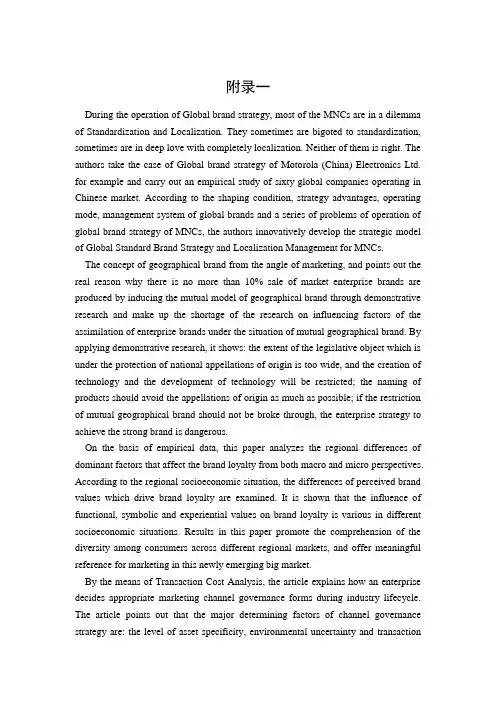
附录一During the operation of Global brand strategy, most of the MNCs are in a dilemma of Standardization and Localization. They sometimes are bigoted to standardization, sometimes are in deep love with completely localization. Neither of them is right. The authors take the case of Global brand strategy of Motorola (China) Electronics Ltd. for example and carry out an empirical study of sixty global companies operating in Chinese market. According to the shaping condition, strategy advantages, operating mode, management system of global brands and a series of problems of operation of global brand strategy of MNCs, the authors innovatively develop the strategic model of Global Standard Brand Strategy and Localization Management for MNCs.The concept of geographical brand from the angle of marketing, and points out the real reason why there is no more than 10% sale of market enterprise brands are produced by inducing the mutual model of geographical brand through demonstrative research and make up the shortage of the research on influencing factors of the assimilation of enterprise brands under the situation of mutual geographical brand. By applying demonstrative research, it shows: the extent of the legislative object which is under the protection of national appellations of origin is too wide, and the creation of technology and the development of technology will be restricted; the naming of products should avoid the appellations of origin as much as possible; if the restriction of mutual geographical brand should not be broke through, the enterprise strategy to achieve the strong brand is dangerous.On the basis of empirical data, this paper analyzes the regional differences of dominant factors that affect the brand loyalty from both macro and micro perspectives. According to the regional socioeconomic situation, the differences of perceived brand values which drive brand loyalty are examined. It is shown that the influence of functional, symbolic and experiential values on brand loyalty is various in different socioeconomic situations. Results in this paper promote the comprehension of the diversity among consumers across different regional markets, and offer meaningful reference for marketing in this newly emerging big market.By the means of Transaction Cost Analysis, the article explains how an enterprise decides appropriate marketing channel governance forms during industry lifecycle. The article points out that the major determining factors of channel governance strategy are: the level of asset specificity, environmental uncertainty and transactionfrequency. During the different stages of industry lifecycle, it is the above three factors that collectively influence the level of channel production efficiency and channel governance efficiency, which ultimately determine what channel governance form an enterprise shall adopt.This article uses the multi-method to study the phase of consumer’s experiences after their impulse buying. We are trying to investigate, when the impulse buying occurred, how the resul t of the impulse buying influenced the consumer’s buying impulsiveness and normative evaluations of the next impulse buying decision. The finding shows that, when the negative result goes to some extent, the next impulsive buying would be influenced very much. And ulteriorly, we find there is much deferent trait between the male and female consumers as well as among the consumers who have different buying impulsiveness trait. As one of general buying behaviors, impulse buying is affected by many factors. Researchers had paid attention to the effect of mood on impulsive buying, but they did not study the process of it.Through introducing the mood self-regulation motivation and browsing,the article expounded the course through which negative mood influenced the impulse buying ,considering the impossible factors during the course at the same time,and the hypotheses were verified by empirical method. Theoretical and managerial implications, as well as future research directions were also provided.Consideration set including a set of brands that a consumer will actively consider and evaluate during his buying process. Only those brands in consideration set can be bought ultimately by consumers . Consideration set has been an important research field of Western scholars for about forty years, While our domestic scholars carried through little research on this topic .This paper will test the influence of product-harm crisis and its responsing process on consumer consideration set using data from a filed experiment carried out in shanghai.Customers are likely to view the services as a bundle of attributes, which may differ in their contribution from the service evaluation and choice. In this article, we study the attributes of inpatients satisfaction. By using factor analysis and multiple linear regression, we found (1) the attributes which affect inpatients’ satisfaction include medical quality, the understanding and communication with hospital staff, environment, waiting time and additional service. (2) medical quality is the most important aspect. The second is understanding and communication. The other three attributes are not so import.Building a model of customer decision-making behaviour to the international education industry for understanding the characteristics of this kind of decision-making behaviour. The results indict that the model as cultural value—motivation—intent to study abroad gives us a good way to understand the students who intent to study abroad. The financial barriers and psychological problem will moderate the relationship between motivations and intention to study abroad. Under the current competition environment, building good relationship with high value customers is an important way for enterprises to gain competitive advantage. An approach to cluster customers and analyze their characteristics is put forward in this paper. The basic analysis process of the method consists three stages. Firstly, through querying transaction records and analyzing transaction cost, each customer’s total profit contribution to enterprise can be gained, and it is used to measure the customer value. Secondly, the k-means clustering method is used to partition customers into different clusters by their value. Lastly, a decision tree is built to reflect customer characteristics with different customer value, and help the management to develop right customer strategy.This article expands the concept of brand in theory, gives the relation and harmony theory model of enterprise innovation competence and the competitive competence of brand, and studies the multiplier effect theories of enterprise's innovation ability and brand competitiveness.Based on the theories of marketing channel behaviors and relationship marketing, by testing hypotheses, this paper explores the impact of relationship marketing orientation on a firm’s marketing channel behaviors. It found that, firstly, relationship marketing orientation has a positive effect on a firm’s exercises of noncoercive power, and has a negative moderate effect on the positive relationship between firm’s power and its exercises of coercive power. Secondly, relationship marketing orientation positively affects a firm to adopt joint-problem-resolution approach. And finally, a firm’s exercises of coercive power are positively related to the firm’s adoption of joint-planning approach, and the firm’s exercises of noncoercive power are negatively related to the firm’s adoption of joint-planning approach and positively related to the firm’s adoption of joint-problem-resolution approach.In this paper, the model of Revelation Principle in Game Theory is used into Market Segmentation. In the initial transaction, the monopolistic firm offers a menu of Marketing Strategies Portfolio designed according to the distribution o f customers’utility in order to differentiate customers based on their selected marketing strategy. In a long-term firm- customers relationship, the firm implements Market Segmentation through the information gained in the initial transaction, and get the added value by customization in product development or individualistic service. We investigated the Market Segmentation implemented through matching of product and pricing strategy and its properties, and proved similar result resulted from combination of product, pricing and promotion strategy.From: Philip kotler(2004). Megamarketing.Various Views’ World.Harvard.Business Review.附录二在贯彻全球品牌战略的过程中,各跨国公司经常会在标准化与本土化之间处于模棱两可、进退两难的境地,有时可能陷入脱离东道国市场的盲目标准化的思路,有时又可能实行完全本土化的思路。
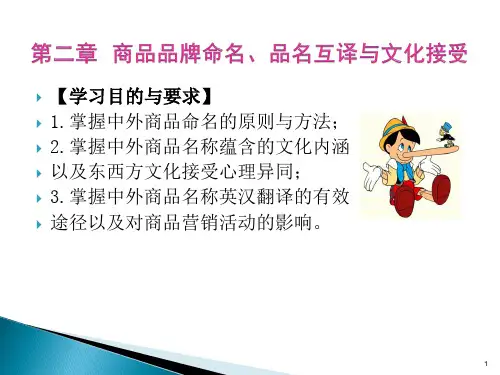
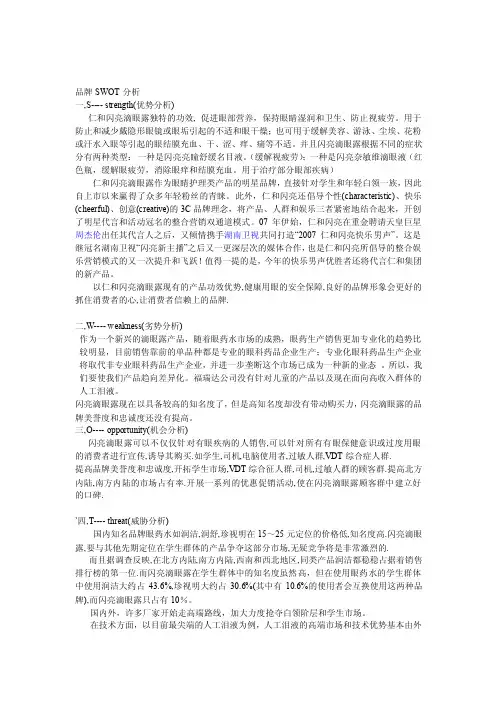
品牌SWOT分析一,S---- strength(优势分析)仁和闪亮滴眼露独特的功效, 促进眼部营养,保持眼睛湿润和卫生、防止视疲劳。
用于防止和减少戴隐形眼镜或眼垢引起的不适和眼干燥;也可用于缓解美容、游泳、尘埃、花粉或汗水入眼等引起的眼结膜充血、干、涩、痒、痛等不适。
并且闪亮滴眼露根据不同的症状分有两种类型:一种是闪亮亮瞳舒缓名目液。
(缓解视疲劳);一种是闪亮奈敏维滴眼液(红色瓶,缓解眼疲劳,消除眼痒和结膜充血。
用于治疗部分眼部疾病)仁和闪亮滴眼露作为眼睛护理类产品的明星品牌,直接针对学生和年轻白领一族,因此自上市以来赢得了众多年轻粉丝的青睐。
此外,仁和闪亮还倡导个性(characteristic)、快乐(cheerful)、创意(creative)的3C品牌理念,将产品、人群和娱乐三者紧密地结合起来,开创了明星代言和活动冠名的整合营销双通道模式。
07年伊始,仁和闪亮在重金聘请天皇巨星周杰伦出任其代言人之后,又倾情携手湖南卫视共同打造“2007仁和闪亮快乐男声”。
这是继冠名湖南卫视“闪亮新主播”之后又一更深层次的媒体合作,也是仁和闪亮所倡导的整合娱乐营销模式的又一次提升和飞跃!值得一提的是,今年的快乐男声优胜者还将代言仁和集团的新产品。
以仁和闪亮滴眼露现有的产品功效优势,健康用眼的安全保障,良好的品牌形象会更好的抓住消费者的心,让消费者信赖上的品牌.二,W---- weakness(劣势分析)作为一个新兴的滴眼露产品,随着眼药水市场的成熟,眼药生产销售更加专业化的趋势比较明显,目前销售靠前的单品种都是专业的眼科药品企业生产;专业化眼科药品生产企业将取代非专业眼科药品生产企业,并进一步垄断这个市场已成为一种新的业态。
所以,我们要使我们产品趋向差异化。
福瑞达公司没有针对儿童的产品以及现在面向高收入群体的人工泪液。
闪亮滴眼露现在以具备较高的知名度了,但是高知名度却没有带动购买力,闪亮滴眼露的品牌美誉度和忠诚度还没有提高。
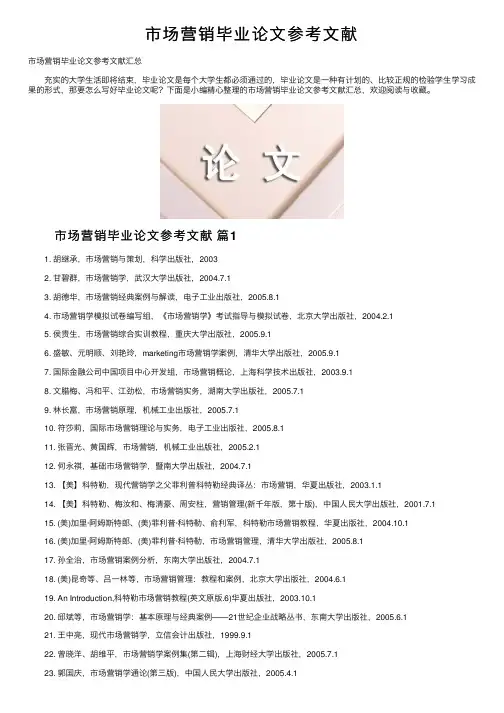
市场营销毕业论⽂参考⽂献市场营销毕业论⽂参考⽂献汇总 充实的⼤学⽣活即将结束,毕业论⽂是每个⼤学⽣都必须通过的,毕业论⽂是⼀种有计划的、⽐较正规的检验学⽣学习成果的形式,那要怎么写好毕业论⽂呢?下⾯是⼩编精⼼整理的市场营销毕业论⽂参考⽂献汇总,欢迎阅读与收藏。
市场营销毕业论⽂参考⽂献篇1 1. 胡继承,市场营销与策划,科学出版社,2003 2. ⽢碧群,市场营销学,武汉⼤学出版社,2004.7.1 3. 胡德华,市场营销经典案例与解读,电⼦⼯业出版社,2005.8.1 4. 市场营销学模拟试卷编写组,《市场营销学》考试指导与模拟试卷,北京⼤学出版社,2004.2.1 5. 侯贵⽣,市场营销综合实训教程,重庆⼤学出版社,2005.9.1 6. 盛敏、元明顺、刘艳玲,marketing市场营销学案例,清华⼤学出版社,2005.9.1 7. 国际⾦融公司中国项⽬中⼼开发组,市场营销概论,上海科学技术出版社,2003.9.1 8. ⽂腊梅、冯和平、江劲松,市场营销实务,湖南⼤学出版社,2005.7.1 9. 林长富,市场营销原理,机械⼯业出版社,2005.7.1 10. 符莎莉,国际市场营销理论与实务,电⼦⼯业出版社,2005.8.1 11. 张晋光、黄国辉,市场营销,机械⼯业出版社,2005.2.1 12. 何永祺,基础市场营销学,暨南⼤学出版社,2004.7.1 13. 【美】科特勒,现代营销学之⽗菲利普科特勒经典译丛:市场营销,华夏出版社,2003.1.1 14. 【美】科特勒、梅汝和、梅清豪、周安柱,营销管理(新千年版,第⼗版),中国⼈民⼤学出版社,2001.7.1 15. (美)加⾥·阿姆斯特郎、(美)菲利普·科特勒、俞利军,科特勒市场营销教程,华夏出版社,2004.10.1 16. (美)加⾥·阿姆斯特郎、(美)菲利普·科特勒,市场营销管理,清华⼤学出版社,2005.8.1 17. 孙全治,市场营销案例分析,东南⼤学出版社,2004.7.1 18. (美)昆奇等、吕⼀林等,市场营销管理:教程和案例,北京⼤学出版社,2004.6.1 19. An Introduction,科特勒市场营销教程(英⽂原版.6)华夏出版社,2003.10.1 20. 邱斌等,市场营销学:基本原理与经典案例——21世纪企业战略丛书,东南⼤学出版社,2005.6.1 21. 王中亮,现代市场营销学,⽴信会计出版社,1999.9.1 22. 曾晓洋、胡维平,市场营销学案例集(第⼆辑),上海财经⼤学出版社,2005.7.1 23. 郭国庆,市场营销学通论(第三版),中国⼈民⼤学出版社,2005.4.1 24. 李品媛等,市场营销学精选案例评析,安徽⼈民出版社,2002.1.1 25. (美)索罗门等、何伟祥、熊荣⽣等,市场营销学原理:第4版,经济科学出版社,2005.10.1 26. 王⽅华,市场营销学,复旦⼤学出版社,2001.7.1 27. (美)布恩等、赵银德等,当代市场营销学,机械⼯业出版社,2005.5.1 28. 普赖德等、梅清豪等,营销观念与战略,中国⼈民⼤学出版社,2005.6.1 29. (美)埃策尔、(美)沃克、(美)斯坦顿、张平淡、⽜海鹏,新时代的市场营销(第13版),企业管理出版社,2004.8.1 30. (美)杰恩、贾光伟,市场营销策划与战(第六版),中信出版社,2004.4.1 31. 吴健安,市场营销学(第三版),安徽⼈民出版社,2004.1.1 32. 郭芳芳、陈顺霞,市场营销学习题集,上海财经⼤学出版社,2005.9.1 33. 何⽴居,市场营销理论与实务,机械⼯业出版社,2004.9.1 34. 陈信康,市场营销学案例集,上海财经⼤学出版社,2003.8.1 35. 兰苓,现代市场营销学,⾸都经济贸易⼤学出版社,2005.1.1 36. 钱旭潮,市场营销管理:需求的创造和传递,机械⼯业出版社,2005.9.1 市场营销毕业论⽂参考⽂献篇2 [1][美]沃伦.基根.全球营销管理[M].北京:清华⼤学出版社,1997年版. [2][美]菲⼒浦.科特勒.市场营销管理[M]..北京:中国⼈民⼤学出版社,996年版. [3]屈云波.品牌营销[M]..北京:.企业管理出版社,1996年版. [4]李弘,董⼤海.市场营销[M].⼤连:⼤⼯出版社,.2000年版. [5]京华企业咨询公司(编).品牌巨匠[M].北京:今⽇中国出版社,1996年版. [6]汤正如.市场营销学教学[M]..沈阳:辽宁⼤学出版社,1993年版. [7]京华企业咨询公司(编).品牌巨匠[M].北京:今⽇中国出版社,1996年版. [8].朱⽅明.品牌促销[M].北京:中国经济出版社,1998年版. [9]吴宪和.营销形象策划[M].上海:上海财经⼤学出版社,1998年版. [10]晃钢令.营销战略策划[M].上海:上海财经⼤学出版社,1998年版. [11]朱⽅明.品牌促销[M].北京:中国经济出版社,1998年版. [12]陈志.中国民营企业品牌战略[J].当代经理⼈(中旬刊),2006,(21). [13]⽊梓.以品牌战略推动企业发展[J].信息⽹络,2007,(3). [14]刘红霞.我国企业品牌战略问题研究[J].江西⾦融职⼯⼤学学报,2007,(1). [15]刘新民.我国品牌战略存在的问题与对策[J].郑州航空⼯业管理学院学报,2005,(4). [16]胡号寰,钟兆青.中国企业实施品牌战略的思考[J].长江⼤学学报(社会科学版),2005,(6). [17]董伟达.品牌战略与企业发展的关系[J].科技与管理,2005,(6). [18]于法领.关于品牌战略[J]. 北⽅经济,2005,(10). [19]李⽔平.浅谈企业的品牌战略[J].湖南财经⾼等专科学校学报,2004,(3). [20]姬雄华.企业品牌战略选择研究[J]. 延安⼤学学报(社会科学版),2001,(3). [21]蒋海岩.实施品牌战略创企业名牌[J].⼭东⾏政学院.⼭东省经济管理⼲部学院学报,2001,(2). [22]赵⼩红.试论品牌战略的实施要点[J].科技情报开发与经济,2001,(6). [23]Arnold,D. The Handbook of Brand Management, FT/Pitman Publishing, London. [24]Dechernatony, L. and Mcdonald, M.H.B. Creating Powerful Brands, Butterworth Heinemann, Oxford. 1992 [25]Hankinson, G. and Cowking, P Branding in Action, McGraw-Hill,London. 1993 [26]Kapferer, J. H Strategic Brand Management, Kogan Page,London. 市场营销毕业论⽂参考⽂献篇3 [1]周晓杰.我国中⼩企业营销渠道变⾰策略研究[M].西安:西北⼤学出版社,2006. [2]郑双乐.中⼩企业的直销模式研究[D].北京:北京交通⼤学经济管理学院,2007. [3]苗⽉新,王俊杰,李凡副.营销渠道概论[M].北京:清华⼤学出版社,2007. [4]黄敏学.⽹络营销[M].武汉:武汉⼤学出版社,2010. [5]汤向东.海尔集团的营销渠道策略分析[J].中国市场,2011(2):104-106 [6]陈书兴.论我国中⼩企业市场营销渠道建设[J].现代经济信息,2009,21-135. [7]菲利普·科特勒,凯⽂?莱恩.营销管理[M].上海:上海⼈民出版社,2007.C8]罗森布洛姆.营销渠道:管理的视野[M].北京:中国⼈民⼤学出版社,2007. [9]影响⼒中央研究院教材专家组.渠道为王⼀销售渠道建设三部曲[M].北京:电⼦⼯业出版社.2009. [10]王⽅华,奚俊芳.营销渠道[M].上海:上海交通⼤学出版社,2005. [11]屈云波,李奕霏,黄盛.营销企划⼿册[M].北京:企业管理出版社,2009. [12]苗⽉新,王俊杰,李凡副.营销渠道概论[M].北京:清华⼤学出版社,2007. [13]陈翔.新型⼯业化下中⼩企业市场营销渠道的变⾰[D].苏州:苏州⼤学,2007. [14]杨树青.我国中⼩企业营销渠道变⾰驱动因素研究[J].沈阳⼯业⼤学学报(社会科学版),2008,1(2):165-169. [15]朱明.家电企业营销渠道管理研究[D].贵州:贵州⼤学⼯商管理学院,2007. [16]郑书雄.营销渠道变⾰下的'企业策略调整[J].商业时代,2006(28):21-22. [17]李飞.分销渠道:设计与管理[M].北京:清华⼤学出版社.2003. [18]李晓健.不同发展阶段的中⼩企业战略选择研究[J].科技信息(科学教研),2008,13. [19]王华.基于⽣命周期理论的建筑企业成长战略研究[D].北京:北京化⼯⼤学,2005. [20]昆奇,吕⼀林.市场营销管理:教程和案例[M].北京:北京⼤学出版社,2004. [21]A.Jueland,S.Shugan.ManagingChannalProfits[J].MarketingScience,1983(2):239-272 [22]P.Rey,J.Stiglitz.VerticalRestraintandProducersCompetition[J].EuropeanEconomicReview,1988,32:561-568 [23]ChoiS.Chan.PriceCompetitioninaChannelStructurewithaCommonRetailer[J].MarktingScience,1991,10(4):271-296 市场营销毕业论⽂参考⽂献篇4 [1](美)菲利普.科特勒.营销管理(第⼋版)[M].上海⼈民出版社.1994:920. [2](美)杜塞尔.麦肯锡⽅法[M].北京:机械⼯业出版社,2010. [3][美]PhilipKotler,GaryArmstrong.PrinciplesofMarketing(9hEdition)[M].北京:清华⼤学出版社,2002:128-162. [4][美]迈克.波特.竞争战略[M].北京:华夏出版社,1997:33-60. [5]菲利普.科特勒,阿姆斯特朗.市场营销学[M].北京:清华⼤学出版社,2012:3. [6]罗伯特.肖有效营销[M].北京:中信出版社,2004:5. [7][美]杰恩.巴尼著.王俊杰,杨彬等译.获得与保持竞争优势(第2版)[M].北京:机械⼯业出版社,2013 [8][美]科特勒著,⾼登第译.科特勒营销策略[M].北京:中信出版社,2011 [9]斯蒂芬.罗宾斯著,黄卫伟等译.管理学[M].北京:中国⼈民⼤学出版社,1997. [10]萨布哈什.杰恩.市场营销策划与战略[M].北京:中信出版社,2009. [11]张建华.⼗六⼤以后关注⾯临的⾸要问题[M].北京:经济⽇报:2011:74-82 [12]杨慧.市场营销学[M].北京:中国社会科学出版社,2011. [13]晃钢令.市场营销学[M].上海:上海财经⼤学出版社,2003. [14]何永祺,张传忠,蔡新春.市场营销学[M].辽宁:东北财经⼤学出版社,2007:358-363 [15]⽜克洪.⼭东省管煤炭企业核⼼竞争⼒分析与评价体系研究[J].煤炭企业,2010,(8). [16]惠卫峰.⾦融危机下煤炭企业⾯临的问题与对策[J].煤炭经济研究,2009.8:15-16. [17]苏⼤华.浅谈煤炭市场营销策略[J].内江科技,2008,(03). [18]赵⽂⽣.铁煤集团煤炭营销策略分析[J].中国煤炭,2009,32(05). [19]刘东⽣.构建与实施煤炭关系营销战略的研究[J].华北科技学院学报,2007,33(02). [20]嵇建新.煤炭企业营销策略[J].合作经济与科技,2009,(13). [21]董秀英.浅谈煤炭企业营销渠道管理[J].集团经济研究,2011(193):160. [22]吕⽂培.打造以和谐共赢为特⾊的煤炭营销⽂化[J].中国煤炭,2011(2):112-114. [23]解培友.煤炭营销策略的思考[J].⿊龙江科技信息,2011(2):149. [24]江德,钱伯民.浅谈煤炭企业的营销策略[J].煤炭经济研究,2005(11):80. [25]陶秋明.煤炭企业市场营销问题及对策[J].现代商业,2011(5):76. [26]陈⼴军.煤炭企业市场营销途径的创新[J].⿊龙江科技信息,2010(18):82. [27]张华.浅述煤炭营销策略的整合[J].⼭东煤炭科技,2010,(6). [28]Robert.J.DolanandHermannSimon,PowerPricers,AcrosstheBoard,May,1997. [29]JagdishNSheth.Marketingproductivity:IssuesandAnalysis.JournalofBusinessResearch.NewYork.May2002,2-30. [30]安俨.试论分销渠道策略成为企业主要竞争策略的原因[J].现代商业.2008,(3).⽂献期刊⽹客服服务外⽂期刊⽹外⽂⽂献翻译。
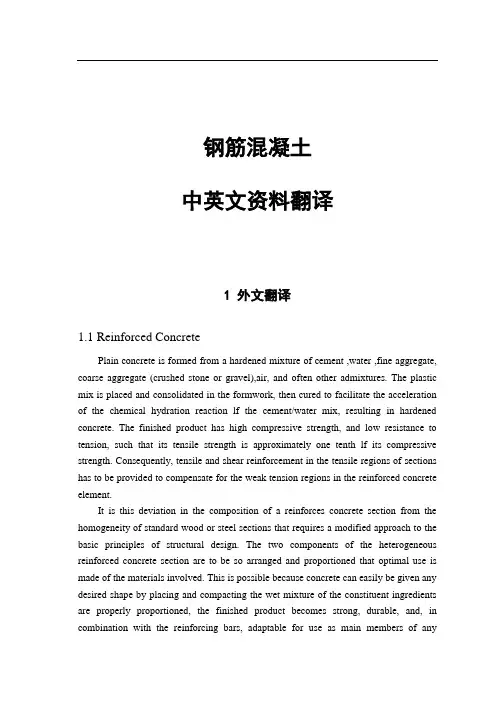
钢筋混凝土中英文资料翻译1 外文翻译1.1 Reinforced ConcretePlain concrete is formed from a hardened mixture of cement ,water ,fine aggregate, coarse aggregate (crushed stone or gravel),air, and often other admixtures. The plastic mix is placed and consolidated in the formwork, then cured to facilitate the acceleration of the chemical hydration reaction lf the cement/water mix, resulting in hardened concrete. The finished product has high compressive strength, and low resistance to tension, such that its tensile strength is approximately one tenth lf its compressive strength. Consequently, tensile and shear reinforcement in the tensile regions of sections has to be provided to compensate for the weak tension regions in the reinforced concrete element.It is this deviation in the composition of a reinforces concrete section from the homogeneity of standard wood or steel sections that requires a modified approach to the basic principles of structural design. The two components of the heterogeneous reinforced concrete section are to be so arranged and proportioned that optimal use is made of the materials involved. This is possible because concrete can easily be given any desired shape by placing and compacting the wet mixture of the constituent ingredients are properly proportioned, the finished product becomes strong, durable, and, in combination with the reinforcing bars, adaptable for use as main members of anystructural system.The techniques necessary for placing concrete depend on the type of member to be cast: that is, whether it is a column, a bean, a wall, a slab, a foundation. a mass columns, or an extension of previously placed and hardened concrete. For beams, columns, and walls, the forms should be well oiled after cleaning them, and the reinforcement should be cleared of rust and other harmful materials. In foundations, the earth should be compacted and thoroughly moistened to about 6 in. in depth to avoid absorption of the moisture present in the wet concrete. Concrete should always be placed in horizontal layers which are compacted by means of high frequency power-driven vibrators of either the immersion or external type, as the case requires, unless it is placed by pumping. It must be kept in mind, however, that over vibration can be harmful since it could cause segregation of the aggregate and bleeding of the concrete.Hydration of the cement takes place in the presence of moisture at temperatures above 50°F. It is necessary to maintain such a condition in order that the chemical hydration reaction can take place. If drying is too rapid, surface cracking takes place. This would result in reduction of concrete strength due to cracking as well as the failure to attain full chemical hydration.It is clear that a large number of parameters have to be dealt with in proportioning a reinforced concrete element, such as geometrical width, depth, area of reinforcement, steel strain, concrete strain, steel stress, and so on. Consequently, trial and adjustment is necessary in the choice of concrete sections, with assumptions based on conditions at site, availability of the constituent materials, particular demands of the owners, architectural and headroom requirements, the applicable codes, and environmental reinforced concrete is often a site-constructed composite, in contrast to the standard mill-fabricated beam and column sections in steel structures.A trial section has to be chosen for each critical location in a structural system. The trial section has to be analyzed to determine if its nominal resisting strength is adequate to carry the applied factored load. Since more than one trial is often necessary to arrive at the required section, the first design input step generates into a series of trial-and-adjustment analyses.The trial-and –adjustment procedures for the choice of a concrete section lead to the convergence of analysis and design. Hence every design is an analysis once a trial section is chosen. The availability of handbooks, charts, and personal computers and programs supports this approach as a more efficient, compact, and speedy instructionalmethod compared with the traditional approach of treating the analysis of reinforced concrete separately from pure design.1.2 EarthworkBecause earthmoving methods and costs change more quickly than those in any other branch of civil engineering, this is a field where there are real opportunities for the enthusiast. In 1935 most of the methods now in use for carrying and excavating earth with rubber-tyred equipment did not exist. Most earth was moved by narrow rail track, now relatively rare, and the main methods of excavation, with face shovel, backacter, or dragline or grab, though they are still widely used are only a few of the many current methods. To keep his knowledge of earthmoving equipment up to date an engineer must therefore spend tine studying modern machines. Generally the only reliable up-to-date information on excavators, loaders and transport is obtainable from the makers.Earthworks or earthmoving means cutting into ground where its surface is too high ( cuts ), and dumping the earth in other places where the surface is too low ( fills). Toreduce earthwork costs, the volume of the fills should be equal to the volume of the cuts and wherever possible the cuts should be placednear to fills of equal volume so as to reduce transport and double handlingof the fill. This work of earthwork design falls on the engineer who lays out the road since it is the layout of the earthwork more than anything else which decides its cheapness. From the available maps ahd levels, the engineering must try to reach as many decisions as possible in the drawing office by drawing cross sections of the earthwork. On the site when further information becomes available he can make changes in jis sections and layout,but the drawing lffice work will not have been lost. It will have helped him to reach the best solution in the shortest time.The cheapest way of moving earth is to take it directly out of the cut and drop it as fill with the same machine. This is not always possible, but when it canbe done it is ideal, being both quick and cheap. Draglines, bulldozers and face shovels an do this. The largest radius is obtained with the dragline,and the largest tonnage of earth is moved by the bulldozer, though only over short distances.The disadvantages of the dragline are that it must dig below itself, it cannot dig with force into compacted material, it cannot dig on steep slopws, and its dumping and digging are not accurate.Face shovels are between bulldozers and draglines, having a larger radius of action than bulldozers but less than draglines. They are anle to dig into a vertical cliff face in a way which would be dangerous tor a bulldozer operator and impossible for a dragline.Each piece of equipment should be level of their tracks and for deep digs in compact material a backacter is most useful, but its dumping radius is considerably less than that of the same escavator fitted with a face shovel.Rubber-tyred bowl scrapers are indispensable for fairly level digging where the distance of transport is too much tor a dragline or face shovel. They can dig the material deeply ( but only below themselves ) to a fairly flat surface, carry it hundreds of meters if need be, then drop it and level it roughly during the dumping. For hard digging it is often found economical to keep a pusher tractor ( wheeled or tracked ) on the digging site, to push each scraper as it returns to dig. As soon as the scraper is full,the pusher tractor returns to the beginning of the dig to heop to help the nest scraper.Bowl scrapers are often extremely powerful machines;many makers build scrapers of 8 cubic meters struck capacity, which carry 10 m ³ heaped. The largest self-propelled scrapers are of 19 m ³ struck capacity ( 25 m ³ heaped )and they are driven by a tractor engine of 430 horse-powers.Dumpers are probably the commonest rubber-tyred transport since they can also conveniently be used for carrying concrete or other building materials. Dumpers have the earth container over the front axle on large rubber-tyred wheels, and the container tips forwards on most types, though in articulated dumpers the direction of tip can be widely varied. The smallest dumpers have a capacity of about 0.5 m ³, and the largest standard types are of about 4.5 m ³. Special types include the self-loading dumper of up to 4 m ³and the articulated type of about 0.5 m ³. The distinction between dumpers and dump trucks must be remembered .dumpers tip forwards and the driver sits behind the load. Dump trucks are heavy, strengthened tipping lorries, the driver travels in front lf the load and the load is dumped behind him, so they are sometimes called rear-dump trucks.1.3 Safety of StructuresThe principal scope of specifications is to provide general principles and computational methods in order to verify safety of structures. The “ safety factor ”, which according to modern trends is independent of the nature and combination of the materials used, can usually be defined as the ratio between the conditions. This ratio is also proportional to the inverse of the probability ( risk ) of failure of the structure.Failure has to be considered not only as overall collapse of the structure but also as unserviceability or, according to a more precise. Common definition. As the reaching of a “limit state ” which causes the construction not to accomplish the task it was designedfor. There are two categories of limit state :(1)Ultimate limit sate, which corresponds to the highest value of the load-bearing capacity. Examples include local buckling or global instability of the structure; failure of some sections and subsequent transformation of the structure into a mechanism; failure by fatigue; elastic or plastic deformation or creep that cause a substantial change of the geometry of the structure; and sensitivity of the structure to alternating loads, to fire and to explosions.(2)Service limit states, which are functions of the use and durability of the structure. Examples include excessive deformations and displacements without instability; early or excessive cracks; large vibrations; and corrosion.Computational methods used to verify structures with respect to the different safety conditions can be separated into:(1)Deterministic methods, in which the main parameters are considered as nonrandom parameters.(2)Probabilistic methods, in which the main parameters are considered as random parameters.Alternatively, with respect to the different use of factors of safety, computational methods can be separated into:(1)Allowable stress method, in which the stresses computed under maximum loads are compared with the strength of the material reduced by given safety factors.(2)Limit states method, in which the structure may be proportioned on the basis of its maximum strength. This strength, as determined by rational analysis, shall not be less than that required to support a factored load equal to the sum of the factored live load and dead load ( ultimate state ).The stresses corresponding to working ( service ) conditions with unfactored live and dead loads are compared with prescribed values ( service limit state ) . From the four possible combinations of the first two and second two methods, we can obtain some useful computational methods. Generally, two combinations prevail:(1)deterministic methods, which make use of allowable stresses.(2)Probabilistic methods, which make use of limit states.The main advantage of probabilistic approaches is that, at least in theory, it is possible to scientifically take into account all random factors of safety, which are then combined to define the safety factor. probabilistic approaches depend upon :(1) Random distribution of strength of materials with respect to the conditions offabrication and erection ( scatter of the values of mechanical properties through out the structure );(2) Uncertainty of the geometry of the cross-section sand of the structure ( faults and imperfections due to fabrication and erection of the structure );(3) Uncertainty of the predicted live loads and dead loads acting on the structure;(4)Uncertainty related to the approximation of the computational method used ( deviation of the actual stresses from computed stresses ).Furthermore, probabilistic theories mean that the allowable risk can be based on several factors, such as :(1) Importance of the construction and gravity of the damage by its failure;(2)Number of human lives which can be threatened by this failure;(3)Possibility and/or likelihood of repairing the structure;(4) Predicted life of the structure.All these factors are related to economic and social considerations such as:(1) Initial cost of the construction;(2) Amortization funds for the duration of the construction;(3) Cost of physical and material damage due to the failure of the construction;(4) Adverse impact on society;(5) Moral and psychological views.The definition of all these parameters, for a given safety factor, allows construction at the optimum cost. However, the difficulty of carrying out a complete probabilistic analysis has to be taken into account. For such an analysis the laws of the distribution of the live load and its induced stresses, of the scatter of mechanical properties of materials, and of the geometry of the cross-sections and the structure have to be known. Furthermore, it is difficult to interpret the interaction between the law of distribution of strength and that of stresses because both depend upon the nature of the material, on the cross-sections and upon the load acting on the structure. These practical difficulties can be overcome in two ways. The first is to apply different safety factors to the material and to the loads, without necessarily adopting the probabilistic criterion. The second is an approximate probabilistic method which introduces some simplifying assumptions ( semi-probabilistic methods ) 。
中英文对照外文翻译文献(文档含英文原文和中文翻译)原文:Intelligent vehicle is a use of computer, sensor, information, communication, navigation, artificial intelligence and automatic control technology to realize the environment awareness, planning decision and automatic drive of high and new technology. It in aspects such as military, civil and scientific research has received application, to solve the traffic safety provides a new way.With the rapid development of automobile industry, the research about the car is becoming more and more attention by people. Contest of national competition and the province of electronic intelligent car almostevery time this aspect of the topic, the national various universities are also attaches great importance to research on the topic, many countries have put the electronic design competition as a strategic means of innovative education. Electronic design involving multiple disciplines, machinery and electronics, sensor technology, automatic control technology, artificial intelligent control, computer and communication technology, etc., is a high-tech in the field of many. Electronic design technology, it is a national high-tech instance is one of the most important standard, its research significance is greatThe design though just a demo model, but is full of scientific and practical. First we according to the complex situation of road traffic, in accordance with the appropriate author to make a road model, including bend, straight and pavement set obstacles, etc. On curved and straight, the car along the orbit free exercise, when the small car meet obstacles, pulse modulation infrared sensors to detect the signal sent to the microcontroller, a corresponding control signal according to the program MCU control cars automatically avoid obstacles, to carry on the back, forward, turn left, turn rightSubject partsIntelligent vehicle is a concentration of environment awareness, planning decision, multi-scale auxiliary driving, and other functions in an integrated system, is an important part of intelligent transportation system.In military, civilian, space exploration and other fields has a broad application prospect. The design of smart car control system are studied, based on path planning is a process of the intelligent car control system2.1 theory is put forwardThe progress of science and technology of intelligent led products, but also accelerated the pace of development, MCU application scope of its application is increasingly wide, has gone far beyond the field of computer science. Small to toys, credit CARDS, big to the space shuttle, robots, from data acquisition, remote control and fuzzy control, intelligent systems with the human daily life, everywhere is dependent on the single chip microcomputer, this design is a typical application of single chip microcomputer. This design by implementing the driverless car, on the tests, by the reaction of the single chip microcomputer to control the car, make its become intelligent, automatic forward, turn and stop function, after continuing the perfection of this system also can be applied to road testing, security patrol, can meet the needs of society.In design, the use of the sensors to detect road surface condition, sensor central sea are faint and adopts a comparing amplifier amplification, and the signal input to the controller, the controlled end using stepper motor, because of the step motor is controlled electrical pulse, as long as the output from the controller to satisfy stepper motor merits of fixed control word. In operation of stepping motor and a drivingcircuit, it also to join a drive circuit in the circuit, each function module is different to the requirement of power supply current, the power supply part set up conversion circuit, so as to meet the needs of the various parts. After comparison choice element, design the circuit principle diagram and the circuit board, and do the debugging of hardware, system software and hardware is often the combination of organic whole. Software, on the use of the 51 single-chip timer interrupt to control pavement test interval and the car movement and speed. Due to take that road is simple, it is using more traditional assembly language for programming. For the correctness of the program design, using a commonly used keil c51 simulation software simulation validation, the last is integrated debugging of software and hardware, and prove the correctness and feasibility of the design scheme.2.2 electronic intelligent car design requirements(1) electric vehicles can be able to according to the course to run all the way; (2) electric vehicles can store and display the number of detected metal and sheet metal to the starting line in the distance; (3) are accurately electric cars after exercising all the way to the display of the electric vehicle the entire exercise time; (4) electric cars can't collisions with obstacles in the process of exercise.2.3 the general conception of computer network teaching websiteUsing 89 c51 as the car's control unit, sensor eight-way from outside,in the front of the car, as a black belt in the process of the car into the garage detecting element, at the rear end of the car when connected to eight-channel infrared sensors as the car pulled out of the garage of a black belt in detecting element, the LJ18A3-8 - Z/BX inductive proximity switch as garage iron detecting element, the microcontroller after receiving sensor detects the signal through the corresponding procedures to control the car forward, backward, turn, so that the car's performance indicators meet the requirements of the design.Intelligent car is a branch of intelligent vehicle research. It with the wheel as mobile mechanism, to realize the autonomous driving, so we call it the smart car. Smart car with the basic characteristics of the robot, easy to programming. It with remote control car the difference is that the latter requires the operator to control the steering, start-stop and in a more advanced remote control car can also control the speed (common model car belong to this type of remote control car); The smart car Is to be implemented by computer programming for the car stop, driving direction and speed control, without human intervention. Operator the smart car can be changed by a computer program or some data to change its drive type. This change can be controlled through programming, the characteristics of the car driving way is the biggest characteristic of smart car. The control system of smart car research purpose is to make the car driving with higher autonomy. If any given car a path, through the system,the car can get system for path after image processing of data moving and Angle (a), and can be scheduled path, according to the displacement and Angle information.The control system structure analysisAccording to the above design idea, the structure of the intelligent car control system can be divided into two layers1, the planning layerPC control system, the planning layer provides the information of the whole car driving, including path processing module and communication module. It has to solve the basic problem(1) using what tools to deal with the car path graph;(2) the car movement model is established, the data to calculate the car driving;(3) set up the car's motion model, the data to calculate the car driving;Layer 2, behaviorLower machine control system, the behavior is the underlying structure of a smart car control system, realize the real-time control of the car driving, it includes communication module, motor control module and data acquisition module. It to solve the basic problems are:(1) receiving, processing, PC sends data information;(2) the design of stepping motor control system;(3) information collection and the displacement and Angle of the car, car positioning posture, analysis system control error;The total design schemeSmart car control system are obtained by system structure, order process:(1) start AutoCAD, create or select a closed curve as the cart path, pick up the car starting $path graph(2) to choose the path of the graphics processing, make the car turning exist outside the minimum turning radius of edges and corners with circular arc transition(3) to generate a new path to simulate the motion process of car;(4) to calculate the displacement of the car driving need and wheel Angle, and then sends the data to the machine(5) under the machine after receiving data, through software programming control the rotation speed and Angle of the car wheels and make it according to the predetermined path A complete control system requirements closely linked to each function module in the system, according to the order process and the relationship between them, the total design scheme of the system is available.Design of basically has the following several modulesPart 1, the information acquisition module, data collection is composed of photoelectric detection and operation amplifier module,photoelectric detection were tracing test and speed test of two parts. To detect the signal after budget amplifier module lm324 amplifier plastic to single chip, its core part is several photoelectric sensor.2, control processing module: control processing module is a stc89c52 MCU as the core, the microcontroller will be collected from the information after the judgement, in accordance with a predetermined algorithm processing, and the handling results to the motor drive and a liquid crystal display module, makes the corresponding action.3, perform module: executable module consists of liquid crystal display (LCD), motor drive and motor, buzzer of three parts. LCD is mainly based on the results of single chip real-time display, convenient and timely users understand the current state of the system, motor driver based on single chip microcomputer instruction for two motor movements, can according to need to make the corresponding acceleration, deceleration, turning, parking and other movements, in order to achieve the desired purpose. Buzzer is mainly according to the requirements in a particular position to make a response to the report.译文一、引言智能车辆是一个运用计算机、传感、信息、通信、导航、人工智能及自动控制等技术来实现环境感知、规划决策和自动行驶为一体的高新技术综合体。
外文文献翻译(附原文)外文译文一:产业集群的竞争优势——以中国大连软件工业园为例Weilin Zhao,Chihiro Watanabe,Charla-Griffy-Brown[J]. Marketing Science,2009(2):123-125.摘要:本文本着为促进工业的发展的初衷探讨了中国软件公园的竞争优势。
产业集群深植于当地的制度系统,因此拥有特殊的竞争优势。
根据波特的“钻石”模型、SWOT模型的测试结果对中国大连软件园的案例进行了定性的分析。
产业集群是包括一系列在指定地理上集聚的公司,它扎根于当地政府、行业和学术的当地制度系统,以此获得大量的资源,从而获得产业经济发展的竞争优势。
为了成功驾驭中国经济范式从批量生产到开发新产品的转换,持续加强产业集群的竞争优势,促进工业和区域的经济发展是非常有必要的。
关键词:竞争优势;产业集群;当地制度系统;大连软件工业园;中国;科技园区;创新;区域发展产业集群产业集群是波特[1]也推而广之的一个经济发展的前沿概念。
作为一个在全球经济战略公认的专家,他指出了产业集群在促进区域经济发展中的作用。
他写道:集群的概念,“或出现在特定的地理位置与产业相关联的公司、供应商和机构,已成为了公司和政府思考和评估当地竞争优势和制定公共决策的一种新的要素。
但是,他至今也没有对产业集群做出准确的定义。
最近根据德瑞克、泰克拉[2]和李维[3]检查的关于产业集群和识别为“地理浓度的行业优势的文献取得了进展”。
“地理集中”定义了产业集群的一个关键而鲜明的基本性质。
产业由地区上特定的众多公司集聚而成,他们通常有共同市场、,有着共同的供应商,交易对象,教育机构和其它像知识及信息一样无形的东西,同样地,他们也面临相似的机会和威胁。
在全球产业集群有许多种发展模式。
比如美国加州的硅谷和马萨诸塞州的128鲁特都是知名的产业集群。
前者以微电子、生物技术、和风险资本市场而闻名,而后者则是以软件、计算机和通讯硬件享誉天下[4]。
(一)日常用语:1.Good morning早上好2.How are you? 怎么样?I’m fine, thank you.我很好,谢谢!3.What’s the problem? 出现什么问题?It’s a machine problem.是设备的问题。
4.Why?为什么?Because…因为。
5.Who is the team leader?谁是班长?***is the team leader.***是班长6.Thank you.谢谢You’re welcome.不客气。
(二)术语:1.BOM: 材料清单2.Control Plan:控制计划3.FMEA: 潜在失效模式分析4.FDPR:全日式生产estone: 里程碑6.process:工艺 produce:产品 project: 项目 production:生产7.prototype:样件 8.Team:团队9.warehouse:库房 10.WI: 操作指导书11.WIP:在置品 12.supplier:供应商 customer:客户13.assembly line:装配线 14.parts:零件15.machine:机器 b:实验室17.operator:操作工 18. team leader:班长19. supervisor:主管 20.manager:经理21. problem:问题 22.analysis:分析23.trainee:实习生 24. training:培训25. compressor:压缩机 26.solve:解决27. quality:质量 28. logistics:物流29. maintenance:维修 30.6.CPK:过程能力指数7.FTA: 原因树分析 8.PDCA:计划、做、检查、标准化9.PO: 采购订单 10.SQA:供应商质量保证11.PQA: 产品质量保证 12.SMED:快速换模13.SOP: 全面生产 14.TPM:全员生产维护15.Kaizen: 改善 16.Genba:现场17.TRP:设备有效利用率 18.LLC:经验学习卡19.APT: 自主生产班组 20.APZ: 自主生产区域21.DLI: 直接劳动成本指数 22.TRS:设备利用率23.DPM: 客户交付及时率 24.FIFO:先进先出25.VSA:价值流分析 26.Muda:浪费27.Takt time:客户需求节拍 28.Sequencer:排序器29.MPS:主生产计划 30.Total Line Rejects:一次交检不合格率1.APU: 自主生产单元 2.VPS:法雷奥生产体系3.QRQC:快速反应质量控制4.Line QRQC:生产线QRQC5.APU QRQC: APU QRQC6.Plant QRQC: 工厂QRQC8.Genb a:现场9.三现主义:现场,现实,现物10.PDCA: 计划,做,检查,标准化11.FTA:原因树分析12.5Why:5个为什么13.5W2H: what是什么问题?why为什么是个问题?who谁发现的?where在哪儿发现的?how怎么发现的?how many有多少个好件和坏件?14.5轴心:全面质量,供应商一体化,全员参与,不断的技术创新,生产体系15.LLC:经验学习卡16.5S:整理,整顿,清洁,清扫和修养17.TPM:全员生产维护18.TRP:设备有效利用率19.MPS:主生产计划20.Takt Time:客户需求节拍21.FIFO:先进先出通道22.V SA:价值流分析23.排序器:一张管理看板,用于均衡生产订单(平衡和混合)和通过使用看板卡来传递正确的节拍(Takt time 客户需求节拍))给生产。
毕业设计(论文)外文资料翻译学院(系): 计算机科学与技术学院专业:网络工程姓名:王灿学号: 201317030125外文出处:附件: 1.外文资料翻译译文;2。
外文原文。
指导教师评语:签名:年月日注:请将该封面与附件装订成册。
附件1:外文资料翻译译文网络营销一、网络营销的概念网络营销是企业整体营销战略的一个组成部分,是建立在互联网基础上,借助于互联网的特性来实现一定营销目标的一种营销手段.它以现代营销理论为基础,以开拓市场、增加盈利为目标,利用因特网的技术和功能,最大限度地满足客户需求的经营过程.网络营销的实质是利用互联网对产品的销前、销中、售后个个环节进行跟踪服务,它自始至终贯穿在企业经营的过程。
网络营销在英文中有多种表达方式,每种表达方式都有相应的侧重点和内涵,如Internet Marketing,强调的是以因特网为工具的市场营销;Web Marketing指网站营销,着重于网站的推广,站点与顾客的沟通;Cyber Marketing指网络营销是在虚拟的计算机空间进行运作;E —marketing指与电子商务相对应的电子化、信息化、网络化的营销活动。
现在常用的翻译方式是online Marketing和Internet Marketing,且专指国际互联网营销。
网络营销不一定包括完整的商业交易过程(例如,它可以不考虑网上支付等环节),但它是电子商务的重要组成部分。
在我国,企业应首先发展网络营销,并通过完善企业网络平台稳步过渡到电子商务。
网络营销的主要内容包括网上市场调查、网上消费行为分析、网络营销策略制定、网络营销价格策略制定、网上营销渠道选择以及网络营销管理与控制等。
具体的营销手段有E—mail营销、网络广告和建立网络营销站点等。
二、网络营销的特点互联网的出现深刻地影响了人类生活的每个角落,它如同一种“万能胶”,把企业组织及个人跨时空地联结在一起.在这样一种新的营销环境下,网络营销呈现其独有的特点。
品牌营销战略参考文献和英文文献翻译目录外文文献翻译..............................................................................................1 摘要..........................................................................................................1 1. 品牌战略内涵与其功能意义.......................................................................2 2. 我国企业品牌发展概况..............................................................................3 2.1 国内品牌与国外品牌相比存在着很大的差距............................................3 2.2 品牌发展缺乏整体规划. (4)2.3 产品质量低下品牌个性不足缺乏创新和发展能力.....................................4 2.4 品牌发展策略存在误区. (4)3. 企业品牌策略选择..................................................................................6 3.1 树立正确的品牌竞争意识着力提高品牌竞争能力......................................6 3.2 搞好品牌定位培养消费者品牌偏好与品牌忠诚.. (6)3.3 遵循品牌设计规律注重品牌形象..........................................................7 3.4 采用多种品牌竞争手段 (7)外文翻译原文………………………………………………………………………………….9 1. Brand strategy with its connotations of the functional significance ……………………10 2. Enterprise Brand DevelopmentOverview ………………………………….……......…..12 2.1 Domestic brands and foreign brands……………………………………….………..…..13 2.2 Brand DevelopmentPlanning ………………………………………………..…..……..13 2.3 Overall lack of poor product quality……………………………………………....…….14 2.4 Brand Development Strategy existMistakes …………………………………..……….14 3. Brand strategy to establish a correctchoice ………………………………………….….16 3.1 Brand awareness of competition and strive to improve the competitiveness ……..…....16 3.2 Brands improve brand positioning…………………………………………………..…..16 3.3 Followed branding laws……………………………………………………………..…..17 3.4 Oriented brand image using a variety of means to brand competition ……………..…..17 参考文献1 年小山. 品牌学M . 北京: 清华大学出版社,2003,5 . 2 余鑫炎. 品牌战略与决策M . 卲林: 东北财经大学出版社,2001,7 . 3 梅清豪. 市场本文源自六维论文网M .北京: 电子工业出版社,2001,156. 4 叶海名. 品牌创新与品牌营销M .石家庄: 河北人民出版社出版社,2001 . 5 翁向东. 本土品牌战略M . 杭州: 浙江人民出版社,2002,30-46 . 6 刘威. 品牌战略管理实战手册M . 广州: 广东经济出版社,2004 . 7 广州本田汽车有限兯司EB/OL. 8 李辉. 2007年度家用电器品牌分析J . 2007:3 9 宋永高. 品牌战略与管理M . 浙江大学出版社,2003,73-75. 10 巨天中. 品牌战略M .北京: 中国经济出版社,2004,231. 11 Charles W,Lamb Joseph,Hair Carl McDaniel,Marketing M 6th〃ed〃北京大学出版社,2001 .12 Hart. C.W〃L Heskett J.L &Sasser W. E. Jr. The Profitable Art of Service Recovery〃M . Harvard Business PreviewJ . 1990 :1 48-56 . 13 Kate Bertrand,Marketers Discover What Quality Pearly MeanM . Business Marketin6 1987 4:58-72 . 14 苻国群〃消费者行为学M . 武汉: 武汉大学出版枉,2000 52 . 15 菲利普-科特勒〃市场营销原理M 〃北京:清华大学出版社,2001 . 16 刘强军. 商场现代化J . 2005 2453: 23-27 . 17 美理查德.L. 霍德霍森.市场营销学M 〃上海: 上海人民出版社2004M 〃1326 品牌营销战略参考文献和英文文献翻译摘要从品牌战略的内涵与其功能意义入手探讨了品牌战略在企业营销中的作用。
论文开题报告BSN荷兰商学院要求每位学员在正式撰写《论文》之前须提交一份论文开题报告。
该报告是用以反映学员论文选题的可行性,选题的整体论证思路,论文的框架构建等问题,应使评阅人能从中了解未来论文完成的可行性、内容范围和实施的可能性等主要信息。
学员应在开题报告获得批准之后,再进行《论文》的正式撰写工作。
选题是撰写论文的第一步,选题是否妥当,直接关系到论文的质量与成败。
选题要新颖、要创新,要坚持先进性、科学性、实用性及可行性的原则。
不可仅仅是对前人工作的总结,或是对前人工作的重复。
选题来源包括:与自己实际工作或科研工作相关的、较为熟悉的问题等等。
所选题目不宜过大,越具体越容易收集资料,从某一个方面入手,容易深入开展。
说明:本报告模板中蓝色为叙写说明范例,报告完成后需删除所有蓝色提示语。
以下信息由学员填写:学员信息姓名班级学号提交日期背景介绍本部分应包括学员组织机构的基本信息/背景介绍,学员在组织内的职位。
例如:本人就职于XX公司,担任公司人力资源部主管职位……定义所研究的问题对论文研究的问题进行简要概述,叙写内容即作业中的“发现问题”,问题定位准确、由表及里、由现象到本质,以利于选题的确定。
例如:据本公司人力资源部报告显示2010年本公司一线员工流失率为30% ,中层人员流失率为20%。
2011年初进行了补充招聘,半年后统计,一线员工流失率为32%,中层人员流失率为23%。
公司人员流失率居高不下,严重影响公司的正常运转,造成……。
本文旨在通过论证找到导致公司人员流失率增高的主要原因- 本公司薪资发放不合理,研究寻求正确的薪资配置方案。
拟定论文题目拟定论文的题目。
最好以本企业为立足点进行选题,避免讨论宏观面问题。
请见附录- 参考1例如:中文标题:XX公司薪酬方案研究英文标题:Research on the Salary for XX Company拟用研究方法列举论文中拟使用的研究分析方法名称。
请见附录- 参考2例如:案例分析法、统计分析……文献综述简要阐述:国内外对该研究课题的研究现状及发展动态;对拟运用的理论进行简介。
Brand Strategy ResearchKapferer,J.HAvailable online 11 June 2010Economic globalization,how to adapt to international trends,establish,a strong brand and enhance our competitiveness,have become pressing issues facing enterprises.Based on the analysis of the development of corporate marketing brand strategy in enterprise marketing role.Enterise needs to sue a variety of means of competition to increase brand awarenss, improve brand positioning, an create a good brand image.First, Japanese brands across the board defeat.November 22,2006 morning, NEC announced that it would withdraw from 2G and 2.5mobile phone market ,which means that, following Sharp, Panasonic, Toshiba, Mitsubishi, Sanyo, a Japanese mobile phone manufacturers later withdraw from the Chinese market, Japanese mobile phone has almost all except Kyocera 2G mobile phone market in China out of contention.If we sum up the Chinese household appliance market, today any different from ten years ago,I think the biggest difference is that Japanese companies in China, Japanese home appliance market downturn, the following main reasons: First, rigid enterprise system, decision-making difficult, the reaction was slow, incompatible with the reality of the Chinese market ,it is difficult to adapt to the rapidly changing Chinese market;2 is weak in marketing ,product planning capacity is not strong ,it is difficult to judge according to their marker lacunch to meet consumer demand and forecast products, follow the trend has been in a passive situation, can not satisfy market demand; Third, failure to grasp the industry best time to transition is the Japanese home appliance companies lose an important reason for market dominance.Japanese companies come to the edge in the Chinese market is causing companies tothink deeply about our nation ? To make the internanational route and whether the enterprise of“Japanese Company”to the lessons learned behind?Second, the brand strategy implementation in China the Current Situation Many old famous“flash in the pen”Chinese and foreign enterprises in the Chinese market the brand war;just grow up to be a great impact on national brands. The last century, a little-know 80’s brand ,not being registered by trademark, is to be acquired, squeeze, even if the residue is hard going down really developed very limited.Here atypical case, the lastcentury 80s to early 90s,he worked in air conditioning sector hit wonders of the Warburg in 1998,was acquired Kelon,the subsequent deline in brand image is repeated.Brand strategy has been an increasing emphasis on domestic enterprises caused the government to support.Since the 80s of last century reform and opening up,China’s socialist econonomic construction has made remarkable achievements. From a planned economy to market economy era Chiness companies, brand management has grown out of nothing.Information,local governments at all levels of emphasis on brand-name,organization promoting the efforts,policies measures have greatly ehangced Qinghai, Shenzhen, Wuhan, Ningbo, Shenyang and other cities on the Chinese famous erterprises incentives to 100 million,on Dali an 3 million Yuan ,on brand-name companies have been cities for the 100000yuan reward-200000yuan.Japanese 8th 2009 year to Japanese 11th,the 40th International Consumer Electronics Show(CES) in Las Vegas Ventian hotel opening.National enterprises in the CES,we achieve superior results.It is understood that this year there are 4000 people registered to participate in China CES,including manufacturers,media and spectators,in the exhibition hall,there are 327 exhibitors.Haier is the world’s most authoritative consumer electronics industry media “TWICE”named for the Chinese consumer electronics brand.3.The status of foreign brands in most sectors is still difficult to shake However,we should also see the face of numerous products on the market,allows consumers blurted out genuinely few domestic brands.With the opening up further,to a number of big companies have to squeeze into the Chinese market,Chinese market,a time filled with“sony”,“Coca-Cola”,“rejoice”,“Benz”and various other internantional brands,many of these names foreign brands violently hitting the national brand in China.Although the applian ce industry ,led by haier brand,“Konka”,“Changhong”,“TCL”and other domestic brands have developed well,but with the “Sony”,“Panasonic”“Samsung”and other brands,they are still there competitive disadvangtage;in the IT industry,“Lenovo”,“Founder”,“Great Wall”and other countries compared to ,brand awareness is still insufficient;in Consumer Goods market,“P&G”,“Oliver”,“Henkel”,and other international companies have formed the three pillars.Third,the brand strategy implementation in China Problems and Errors.Currently,Chinese brands have a huge international marker opportunity and space for international brands has been inevitable,but there are also brand building is not unsatisfactory.Our Enterprise Brand Building Problems:Factors from the point of micro-enterprises themselves:there is a lace of technology development,brand competitiveness is not strong;brand personality,lack of innovation and development capacity;small-scale production and management,brand development lack of overall planning;ability of weak erports and internantional operations,Brand awareness is not strong;brand positioning is not clear,there is a large range of factors such as blindness.Speaking from the macro social factors:social mechanisms need to be improved,policies and regulations support the neeed to further strengthen the country’s industrial policy,export-oriented policies for different sectors play different role in the country’s industrial policy,export-oriented policies for different sectors play different role in the promotion and limitation,the financial environment for business investment capacity and market expansion ability and the important influence.The establishment of market system in China has for many years,despite a significant improvement but still not perfect,ther still has not really adapt to the market economy,consumer psychology has not yet fully mature.2.The current situation of global economic integration, the error of the brand strategy implementation(1)Ignore the brand investment,profit-orientedBackground of economic globalization, international competition is increasingly reflected in the brand’s competition, the overwhelming majority of the modern world famous multinational companies with particular emphasis on the use of brand strategy, brand such a full range of output through the form of multinational corporations gradually occupationof the internantional market. it is no exaggeration to say that now,the brand has achieved global strategic objectives of transnational corporations sharp weapon,is an important means to achieve capital expansion.Rome was not built in a day cold .Brand never be in the short term invented to be a long process of accumulation. Many enterprises do not clearly recognize this point,attempt to create a brand in a short time,but ignored the long-term planning and strategy.(2)Brand strategy is a systematicThe implementation of brand strategy is a systematic,enterprise strategy and the overall development of an important component of competitive strategy.Theimplementation of brand strategy is to rely on their overall quality and overall image enhancement,the need for scientific management idea and superb operational skills,but quit a few brand planner in this regard was particularly poor performance and immediate impact brand development ,practical work in the emergence of many such errors:If that job is to create a brand to take a good brand is drawing a satisfactory visual signs only;Advertising is the only way to cuoltivate well-known brands,in addition to adbertising in the media ,big,the other no attention;scale enterprise product once formed,well-known brands on the naturally established;well-known brand is equivalert to high price,to be unrealistically improve the product price.Some companies even to furthrer in the brand Wrong Operation not hesitate to give up their own brand business,with foreign companies,brands,or to sell its own brand low-cost transfer,such as our persent more than 20 million“three capital”enterprises,there 90% of the joint venture using the foreign brands;clean silver toothpaste fctory in Ghuangzhou to 2 million yuan cheap to transfer to joint ventures and other brands,is one such outstanding erample of the terrible consequences of today has become increasingly apparent-lost domestic enterprises own brand,product and intellectual property rights,national industrial competitiveness lie!(3)Product is the enterprise competitive advantage in the market can be quickly imitated by competitors,beyond,the brand is insurmountable,real and lasting competitive advantage comes from innovation,in order to “change”shouldbe “status quo”Brand is the concentrated expression of the core competitiveness.The market is constrantly changing face of any brand at any time to be out of danger .Too much emphasis on the existing achievements,do not attach importance to innovation,leading to a lot of brand-name“dismount”the major reason.Coca-Cola’s former chiefmarketing officer Sergio Zyman,“the brand is only the company logo products and services are different from competitors,is the most effective weapon to open up the market,excellent brand can make your product stand out.”Products physical properties,quantity,price,quality,service is very easy to make your product stand out.” Products physical properties, quantitiy, price, quality,service is very easy to imitate competitors, Er brands, along with the product itself,also includes an attatched product to cultural background, emotional, consumer cognition invisible things,so that enterprises Yong Yuan Li in the competition undefeated.Consumer awareness deciding the fate of the brand has a direct impact on consumer awareness.Brand is the difference deciding the fateof the brand has a direct impact on consumerawareness.Brand is the difference between the market enterprise important symbols is the benchmark for consumer spending to brand as the core has become a cor porate restructuring and reallocation of resources an important mechanism.In addition,enterprises should learn from successful exiperiences abroad to enhance their design and development capability.Enterprises should dare to challenge the new technology revolution to create their own brand, and increase market competitiveness; We must work hard in the value of differentiation has been directly determined to achieve the final product sales,personal services are indispensable!2.To strengthen marketing,improve brand awareness,brand strategy will be organically integrated in their overall strategy to promote the overall development strategy.The implementation of brand marketing is an important part of the strategy.By choosing the right marketing approach can be effectively used to brand a household name brand,expand market share.Brand strategy is not an isolate task,but the overall development strategy and business are closely related.A successful brand names more than just a brand its own thing,related to business management of all major strategic decision,these major strategic decision,these major strategic decisions were consciously carried out around to expand.外文翻译:企业品牌战略研究卡普费雷尔,J.H2010年6月11日在经济全球化的今天,如何适应国际化潮流,建立强势品牌,提高竞争能力,已经成为国内企业面临的迫切问题。